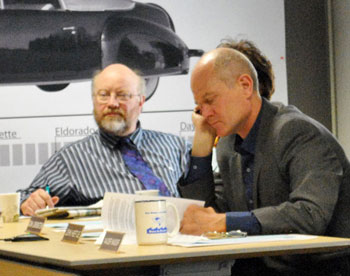DDA Board Grumbles: Budget, Streetlights
Ann Arbor Downtown Development Authority board meeting (June 5, 2013): An oblique quip from a DDA board member during the June meeting signaled likely ongoing friction between the DDA and the Ann Arbor city council: “Too many people’ve been staying up too late on Mondays …” The comment came in the context of two different board votes – one on adopting the DDA’s upcoming fiscal year 2014 budget, and another on adjustments to its current year’s budget as the year comes to a close on June 30.
The DDA had actually already adopted its FY 2014 budget – back on Feb. 6, 2013. And although it’s been customary in the past years for the DDA to adopt its budget in advance of the city council’s approval, the state enabling statute for downtown development authorities provides a different sequence: “Before the budget may be adopted by the board, it shall be approved by the governing body of the municipality.”
Considerable debate on the DDA’s budget had unfolded among city councilmembers at their May 20, 2013 meeting. And the council had ultimately decided on a 10-1 vote to approve a FY 2014 budget for the DDA that differed from the one the DDA had adopted in February. In addition to recognizing an additional $568,000 in tax increment finance revenue (TIF), the council’s action transferred an additional $300,000 from the DDA’s TIF fund to the DDA’s housing fund.
At their June 5 meeting, some DDA board members balked at the council’s action, citing the replacement of rusting-out light poles on Main Street as a more pressing need than reserving funds for undetermined future housing projects. But ultimately the board adopted the council’s approved budget on an 8-2 vote – with dissent from Sandi Smith and John Mouat. Absent from the meeting were Russ Collins and Nader Nassif.
At the June 5 meeting, the board concluded that a portion of the more than $516,000 cost for the Main Street light poles would need to come from the city’s general fund. Mayor John Hieftje indicated at the meeting that in the next month he expected the city council would be presented with a budget resolution authorizing the difference between the $516,000 total cost and the $268,000 that the DDA considers available in its council-approved budget.
Also approved by the DDA board were annual routine adjustments to its current year’s budget, which are undertaken to ensure that actual expenses and revenues are reflected accurately. The adjustments are made so that expenses do not exceed revenues in any of the funds. During those deliberations, back-and-forth between board treasurer Roger Hewitt and Newcombe Clark indicated a realization that the kind of budget amendment they were undertaking for FY 2013, at the end of the fiscal year, might be used to work around the budget levels authorized by the city council. It’s not completely clear if that strategy is possible.
But in response to Hewitt’s assurance that budget amendments could be enacted for any reason – as long as expenditures didn’t exceed revenues – Clark made his comment about people staying up too late on Monday nights. [The city council meets on Monday nights, and the council's deliberations on the DDA budget have gone long into the evening. If the DDA board can change its budget after adopting the council-approved version, then the council's deliberations would seem to be moot.]
The June meeting was Clark’s penultimate one, as his term expires at the end of July and he’s moving to Chicago to take a job there. The board’s July 3 meeting will also be board chair Leah Gunn’s last meeting, which will mark the end of over two decades of service on the DDA board, beginning in 1991.
The parking revenue and patrons report from the public parking system was one of the regular highlights of the meeting. The DDA manages Ann Arbor’s public parking system under a contract with the city. The parking report was complemented by a board resolution that awarded five additional monthly parking permits to The Varsity residential project, bringing its total to seven. The DDA can assign monthly permits to residential projects under the city’s contribution in lieu (CIL) program – which provides a mechanism for building housing without providing parking spaces onsite.
Local developer Peter Allen addressed the board during public commentary, reporting that his company had been one of three to submit bids in response to the city’s RFP (request for proposals) for brokerage services to sell the former Y lot at Fifth and William streets. He told the board he thinks the parcel is worth $5-7 million or more. [Full Story]




